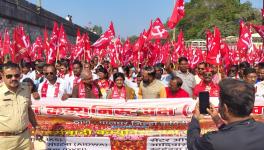‘Kisan Andolan has Provided Rich Lessons for Struggles Ahead’: Prakash Karat
File Photo.
Prakash Karat, a polit bureau member of the Communist Party of India (Marxist) - CPIM - was invited to give a lecture by the Foundation for Agrarian Studies in Bangalore. The online lecture was delivered on February 17, 2022. Karat said, “The three farm laws were a threat to the procurement system that exists for paddy, wheat and other crops. It was meant to facilitate the entry of corporates into agriculture and agriculture marketing.”
The farm laws elicited a response from those who feared that this was the first step towards abolishing the minimum support price (MSP), which farmers in many parts of India see as the last line of protection from income collapse. Around 500 farmer unions came together under the banner of the Sanyukta Kisan Morcha (SKM). The structure of the SKM ensured there was comprehensive consultation and efficient decision making. The movement was unique because there was significant participation of women and children from the Kisan families. Even the khaps of Haryana encouraged women to join the protests.
The movement's victory was achieved at the cost of great sacrifices, though, including the loss of 715 farmer lives. Karat then touched upon the significant political implications of the movement. The movement successfully built a united struggle against neoliberalism and growing corporate control of the Indian economy. Many regional parties, like YSRCP in Andhra Pradesh and BJD in Orissa, were supporters of the farm laws but were forced to change their stance in response to the movement's growing strength.
GEOGRAPHICAL SIGNIFICANCE
The protest sites drew most of their strength from farmers in Punjab, Haryana and UP. The mass upsurge around the capital was difficult for the ruling party to ignore. While the farmers' movement gained solidarity across other parts of the country, its impact was uneven. As a result, the movement led to the isolation of the BJP in Punjab and parts of Western Uttar Pradesh. This is starting to hurt the party's campaign in the ongoing assembly elections in both states.
SETBACK FOR HINDUTVA POLITICS
The movement was able to break the barriers of region, caste, and religion (although temporarily). It was also a push back to the growing communalisation in the villages of Western UP after the Muzaffarnagar riots of 2013. However, such unity, he cautioned, cannot be taken for granted, given the deep penetration of the Hindutva ideology. He, therefore, stressed the need for sustained political and ideological struggles. Despite concerted efforts to communalise the movement by invoking Khalistan, the BJP failed to create fissures within the Kisan movement.
FUTURE OF SKM
The largest farmer union in Punjab, the Bharti Kisan Union (Ekta-Ugrahan), declined an offer to contest the Punjab Assembly elections under the banner of Sanyukt Samaj Morcha (SSM). Karat says that this was the right decision and that the future of the SKM does not lie in electoral politics. “While individuals and leaders can always choose to join any political party of their choice, it is not worthwhile to convert a farmers' organisation into a political organisation. Hastily forming a coalition (of farmers' unions) at the time of elections is not going to work,” he said.
Prakash Karat clarified that the movement's success has not changed the structural relations of production in Indian villages. Notwithstanding the growing strength of the organised Kisan movement, it is still primarily confined to the interests of landowning farmers. “The Left has to orient the Kisan Movement towards the demands of poor peasants and agricultural workers,” he said.
The event was moderated by Madhura Swaminathan, Professor and Head, Economic Analysis Unit, Indian Statistical Institute, Bangalore Centre, and Trustee of the Foundation for Agrarian Studies. The lecture can be accessed on the foundation’s website.
Get the latest reports & analysis with people's perspective on Protests, movements & deep analytical videos, discussions of the current affairs in your Telegram app. Subscribe to NewsClick's Telegram channel & get Real-Time updates on stories, as they get published on our website.
























